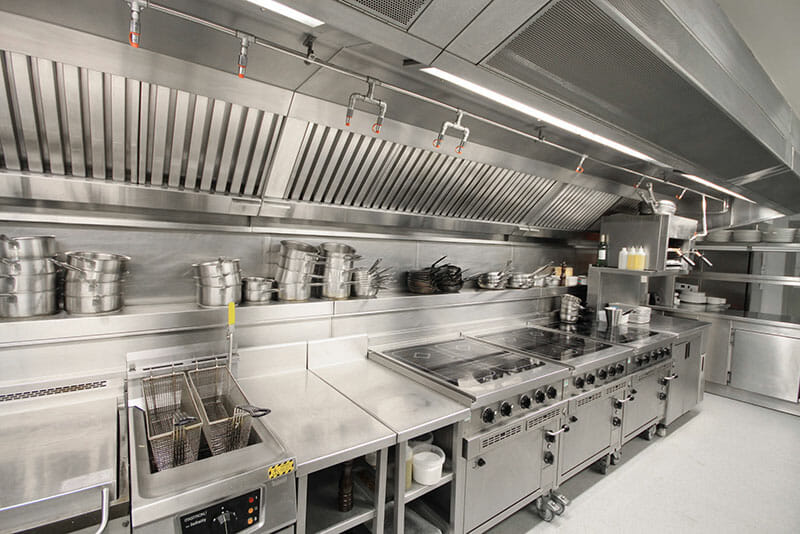Kitchen Fire Suppression System Inspection Houston
Through our kitchen fire suppression system inspection, Houston restaurant owners ensure the safety of their staff and guests.
Modern commercial kitchens are intense environments. There are many employees working in tight quarters around open flames and hot cooking surfaces. High heat causes grease and oil vapors which rise into the hood system. Occasionally these hot oils, grease, or vapors ignite, resulting in localized fires or flare-ups. The fire can quickly spread throughout the kitchen area if not controlled immediately.

The Basics Of A Fire Suppression System
Kitchen Fire Suppression System Inspections: What We Cover
The codes require trained, certified technicians to inspect these systems every six months. This helps to ensure your system operates in peak condition. Moreover, our certified professionals have access to up-to-date manuals and knowledge as well as UL-approved replacement parts. When requesting a kitchen fire suppression system inspection, Houston restaurant owners choose Focus Fire & Safety. Our customers receive thorough examinations by offering the following services:
- Replace all fusible links per NFPA codes
- Check and replace all nozzle caps as required
- Check the flow of each nozzle
- Clean or replace any clogged nozzles
- Adjust the nozzle direction to ensure maximum coverage
- Adjust the cable tension spring assembly
- Check the functionality of remote pull stations
- Verification of all test dates for cylinders and CO2 cartridges
- Replace CO2 cartridges as required
- Check the tank pressures
- Hydrostatically test the tanks every 12 years
- Ensure the integrity of all electrical components
- Provide a written report of our inspection
- Train key employees on the proper use of all safety equipment
For hood fire suppression system inspections, Houston area restaurants count on our experts. Trust our team to inspect, service, and certify your fire safety system.
For Ansul sytem inspections and other brands, contact our experts. To make sure you’re in compliance with all current safety standards, schedule a consultation today.
Fire Extinguisher Inspections Houston Area Businesses Trust
Kitchen Fire Suppression System Inspection FAQ
For kitchen fire suppression system inspection, Houston restauranteurs trust Focus Fire & Safety. We strive for transparency in our process to ensure that your business runs smoothly and safely. In any kitchen, the hood fire suppression system acquires a build-up of grime and grease.
Without regular cleanings, this buildup eventually clogs the nozzles that suppress and extinguish fires. That creates a severe fire hazard for commercial kitchens. As such, it is crucial to maintain your restaurant’s fire suppression system in order to ensure the safety of your business.
Below are some common questions regarding kitchen fire suppression system inspection.
How often do I need a kitchen fire suppression system inspection?
Per NFPA 96, you must schedule and complete a system inspection every six months with a licensed fire protection company. So, twice each year, schedule a time for certified safety professionals to ensure your system is functional.
With a thorough inspection, we ensure your hood suppression system activates, puts out a fire, and shuts off the gas or electricity running to equipment in the event of a fire.
That means a minimum of two commercial restaurant fire suppression system inspections per year.
Additionally, we recommend that restaurant managers and kitchen managers perform a visual inspection of the hood each month. Look for clogs, grease, damage to the system, and anything that seems wrong. When you stay proactive, cleaning saves you money from potential damage down the line.
Consider it this way. A minor inconvenience now is far less than the $60,000 cost of the average uncontained fire in a restaurant.
How do I prepare for an inspection?
Prior to your inspection, all cooking equipment must be cool and not in use. As such, it’s a good idea to schedule inspections in your off-hours. Moreover, you should notify your staff of the service.
Ensure everyone present understands that the fire alarm is out of service during the inspection. Additionally, it’s a good idea to have a kitchen fire suppression system inspection checklist handy to ensure you cover all your bases.
How often should I clean the system?
Oftentimes, we hear people ask when they should clean the vent hood system. They wonder whether it’s better to wait for the inspection. However, if you wait for the bi-annual inspection, that is not nearly enough.
That level of cleaning is not enough to reduce your risk of a fire. As such, we recommend your staff clean the kitchen hood, nozzles, and filter on a regular basis. Whether weekly, monthly, or bi-monthly, it’s a good idea to have it on your regular schedule. When grease builds up, it prevents the fusible links that activate the system from working.
If you work in a high-volume restaurant, it’s a good idea to make cleaning the hood part of a daily routine. This helps to prevent the accumulation of dirt and grease. Moreover, it keeps them from collecting in the flue.
With this addition to your task list, you decrease the likelihood of a hood fire, keep your business in operation, and keep your employees safe.
